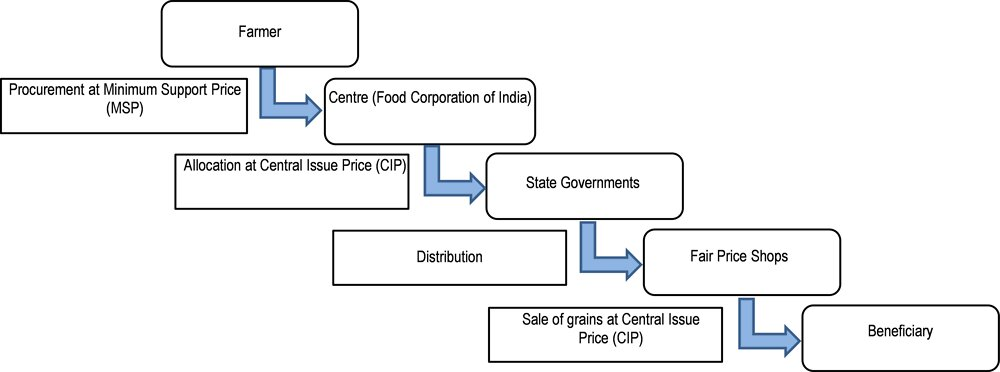Social Justice
FCI Reforms
- 07 May 2020
- 7 min read
This article is based on “A grain stockist with a role still relevant” which was published in The Hindu on 05/05/2020. It talks about issues and solutions pertaining to the Food Corporation of India (FCI).
Food Corporation of India (FCI) was set up under the Food Corporations Act 1964, at the forefront of India’s quest of self-sufficiency in rice and wheat following the Green Revolution, managing procurement and stocking grain that supported a vast Public Distribution System (PDS).
Thus, it has played a critical role in ensuring food security in India and acted as a lifeline for millions of vulnerable across the country.
Today, in the middle of the Covid-19 pandemic, it holds the key to warding off a looming crisis of hunger and starvation, especially in the wake of the migrant crisis and poverty induced by the pandemic.
However, several issues pertaining to FCI make its operations highly inefficient (as every year foodgrains procured by FCI gets rotten) and pushes up the annual food subsidy bill.
Note:
FCI has primary duty to undertake purchase, store, transport, distribute and sell food grains and other foodstuffs.
FCI was mandated with three basic objectives:
- Ensuring food security of the nation by maintaining satisfactory levels of operational buffer stocks of food grains.
- Distribution of food grains throughout the country for the Public Distribution System.
- Effective Price Support Operations for safeguarding the interest of farmers
Issues Pertaining to FCI
Open-Ended Procurement
- FCI conducts “Open-ended procurement” which means the Government will buy (at Minimum Support Price-MSP) any quantity of wheat and rice from any farmer who comes forward to sell.
- Due to this, FCI has huge grain stocks which far exceed buffer-stock norms.
- Also, some of the reasons for these excess stocks are export bans.
- Due to this, FCI’s mounting debts have increased to an estimated ₹2.55 lakh crore by March 2020.
Storage Crisis
- FCI lacks necessary warehousing infrastructure and robust procurement mechanisms.
Due to lack of adequate storage facilities, huge quantities of food grains get wasted.
First in First out principle (FIFO)
- FCI follows a first in, first out principle (FIFO) principle that mandates that grain that has been procured earlier needs to be distributed first to ensure that older stocks are liquidated, both across years and even within a particular year.
- It is time for the FCI to suspend this strategy, if it has not already, that enables movement that costs least time, money and effort.
Lack of Proactive Liquidation Policy
- The current system of liquidation of excess stocks through the Open Market Sale Scheme (Domestic) or through export markets is extremely ad-hoc and slow.
- FCI doesn’t get a good price most of the time, as predetermined price (reserve price) is often less than the acquisition cost/economic cost of grains for FCI and it ends up making a loss in the sale.
Steps To Be Taken
- There is a pressing need for implementing Shanta Kumar Committee recommendations. For example:
- It recommended that FCI should hand over all procurement operations of wheat and rice to the states (having sufficient experience and reasonable infrastructure for procurement). In this context, the central government can incentivise states to follow Decentralized Procurement Scheme (DCP).
- FCI should accept only the surplus (after deducting the needs of the states under NFSA) from these state governments to be moved to deficit states like Eastern Uttar Pradesh, Bihar, West Bengal, Assam etc.
- FCI should outsource its stocking operations to various agencies such as Central Warehousing Corporation (CWC), State Warehousing Corporation (SWC), Private Sector under Private Entrepreneur Guarantee (PEG) scheme.
- There is a need for a transparent liquidation policy that should automatically come into effect whenever FCI is faced with surplus stocks over buffer norms.
- The vibrant network of self-help groups formed under the National Rural Livelihoods Mission (NRLM) can be tasked with the last-mile distribution of food aid other than the PDS.
- Farmer producer organisations (FPOs) have been at the forefront of rebuilding the inefficient supply chains.
- The FCI along with the National Agricultural Cooperative Marketing Federation of India Ltd. (NAFED), is well placed to rope in expertise to manage the logistics to support supply chain management.
Conclusion
These holistic reforms in FCI may help in transforming the food security-oriented crisis management into a stable security system to ensure availability, accessibility and affordability of food grains to all people at all times so that no one, nowhere and at no time should go hungry.
|
Drishti Mains Question Discuss the role played by Food Corporation of India regarding food security. Also highlight the challenges faced by it. |
This editorial is based on “Dangerous Drift” published in The Hindu on 06/05/2020. Now watch this on our YouTube channel.







